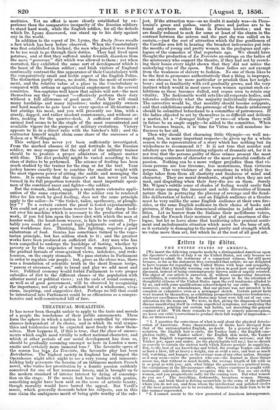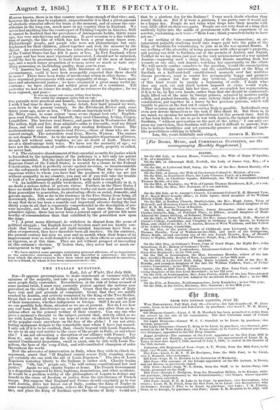Ittftrs fa flit (Pillar.
T HE UNITED STATES OF AMERICA.
[We insert the following remarks made by a distinguished American upon the Spectator's article of July 5 on the United States, not only because we are bound to admit the testimony of a competent witness, but still more because, so far as his statement does contradict that article, we are delighted to have reasons for regarding the United States with hope and sympathy, and to find that a friendly warning can be taken in good part and seriously discussed, instead of being contemptuously thrown aside or angrily retorted. The object of our article is answered, if, without exasperating .American sensibilities, it contributes in the smallest degree to fix the attention of thoughtful citizens of the United States upon the evil tendencies alluded to by us, and with some qualifications acknowledged by our critic. We must, moreover, recall to remembrance, that our picture was not intended to be complete or exhaustive even as a newspaper sketch. Certain patent facts were treated by themselves, as exhibiting prospective dangerous tendencies ; whatever excellences the United States may boast were left out of our con- sideration for the moment. We were, in fact, giving the diagnosis of latent disease manifesting itself in certain superficial symptoms, not analyzing the constitution ; pointing out certain bad habits, not describing the general conduct of life. With these remarks to prevent or remedy misconception, we leave our critic's corrections to produce their full weight of impression.— ED. OF SPECTATOR.] "1. I question the correctness of what is said about the physical deterio- ration of Americans. Sonic characteristics of theirs have diverged from that of the untransplauted English, no doubt. In a general way of de- scription, the English hair is curly, the Yankee lank ; the English com- plexion ruddy, the Yankee sallow ; the English skin moist, the Yankee dry ; the English temperament sanguine, the Yankee nervous ; and the Yankee jaw, upper and under, (so the physiologists tell me,) has so shrunk as scarcely to contain the sixteen teeth which Nature persists in suppling. But, to the best of my knowledge and belief, the average Yankee can strike as hard a blow, lift as heavy a weight, run as swift a race, and bear as much toil, watching, and hunger, as the average man of any other nation. Strange as it may seem—solve the paradox who can—the learned in these things assure me, that without so much health, the average length of life with us is as great as with you ; and, what brings the question to a practical issue_, the calculations at the life-insurance offices, where exactness is sought with mercantile solicitude, distinctly recognize this fact. You see our sickly women, and you prognosticate sadly for the coming race. But what woman do you see ? The travelling, fashionable, luxurious woman. Strong, healthy, and brisk blood is flowing meanwhile in the veins of the millions whom you do not see, and from whom the intellectual and polished circles of the next generation are to be recruited, themselves in their turn to be in like manner superseded. "2. I cannot assent to the view presented of American intemperance. Heaven knows, there is in that country more than enough of that vice ; and, however the fact may be explained, unquestionable it is that a given amount of alcoholic stimulus affects the brain at the moment, and of course the con- stitution in the long run, much more in my country than in England. We
never had anything like the counterpart of Fielding's squire in America. Still
it cannot be doubted that the prevalence of intemperate habits, thirty years ago, was very mischievous and alarming. It gave occasion to a fine exhibi- tion of energy, the like of which has not been a great many times seen. Philanthropic people, and people who were not philanthropic but only frightened for their children, joined together and took the monster by the throat. An extraordinary reform has taken place in thirty years. No part of the United States but has felt it more or leas. In New England, where it began and has been most vigorously prosecuted, I should not be surprised, could the fact be ascertained, to learn that one-half of the men of mature age, and a much larger proportion of women, never so much as taste any- thing possessing an inebriating quality, from year to year.
"3. .America has had, and has, little literature or science. Under the
circumstances, could it have been reasonably expected that there should be more ? There have been fruits of intellectual action in other forms. We have organized governments with some originality, of shape. We have made laws and administered justice ; we have originated a great many useful in- ventions; ve have cleared and settled great part of a continent. Till yesterday we had no leisure for study, and no resources for elegance ; for we were exposed, and poor- , It was no trope our savage tribes that broke, - Nor could the sharpest satire fell an oak.'
Our pursuits were practical and homely, because dictated by daily necessity. I wish I had time to show you, by some detail, how hard pressed we were, even down to the present century. So the Edinburgh Iterino said, some thirty years ago, more or less, Who reads an American book ? ' But within the thirty years, to some extent nous evens change tout eels.' English- men read Prescott, they read Bancroft, they read Channing, Irving, Cooper, Longfellow. The lawyers read Storey, and quote him in Westminster Hall. The sailors, high and low, from admiral's cabin to forecastle, read my friend Dana, and will read him till people stop reading Robinson Crusoe. The mathematicians and astronomers read Pierce,—those of them who are ad- vanced enough. The naturalists read Gray, Harris, Wyman. The orators do not despise Webster. As to the merely imaginative department of letters, though not without some trophies, we are no doubt at fault. There we are at a disadvantage both ways. We have not the maturity of age ; we have not the enthusiasm of youth—for a national youth, properly so called, we never had.
"4. The extensive abandonment of that essential security for justice which is furnished by the independence of the judiciary is a fact only too patent and too mournful. But the judiciary in its highest department, that of the Supreme Court of the United States, is secured by a clause in the Federal Constitution, which is perfectly secure against invasion, so insurmountable are the safeguards which surround that provision. That the views of the sagacious writer to whom you have had the goodness to refer me are not without sympathy in my country, you may see if you will take the trouble to look at a few paragraphs of a pamphlet I make bold to send you.* "6. An indifference to public wickedness, still more a complicity in it, is no doubt a serious defect of private virtue. Further, in the Slave States I have no doubt that the hideous institution works out more and more fatally, from generation to generation, its prostrating effects on social, domestic, and private morals. But so far is the tendency in the Free States from being all downward, that, with some advantages for the comparison, I do not hesitate to say that there has been a sensible and important advance during the last thirty years in all that is commonly comprehended in the description of pri- vate morality, and that in New England, at least since the tunes of the primitive rigour, there has never been a general aspect of private life more worthy of commendation than that exhibited by the generation now upon the stage.
"7. A great many dilettanti do withdraw in disgust from the scene of political struggle ; but English lovers of freedom must not too hastily con- clude that because educated and right-minded Americans have been so often overpowered, they have therefore been all inactive. On the contrary, the present century has seen no year and no month when their hopes of an improvement were so well-founded or so high, or their effects so concentrated or vigorous, as at this time. They are not without prospect of succeeding in this autumn's election. If beaten then, they never had so much en- couragement to try again."
• personal We have omitted some passages containing allusions, of no importance to the corrective statement with which the Spectator is concerned; the letter from which the above extracts have been taken not being addressed to ourselves, but to a friend, by whom it has been communicated.—ED.



































 Previous page
Previous page